Home > Media News >

Source: https://techcrunch.com
Facebook’s next money-maker could be this tool for connecting marketers to social media creators so they can team up on sponsored-content Facebook ad campaigns. The Branded Content Matching search engine lets advertisers select the biographical characteristics of creators’ fans they want to reach, see stats about these audiences, and contact them to hammer out deals.
Leaked screenshots of Facebook’s promotional materials for the tool were first attained and published in German by AllFacebook.de. TechCrunch has now confirmed with Facebook the existence of the test of the search engine. Facebook first vaguely noted it would build a creator-brand tool in March, but now we know what it looks like and exactly how it works.
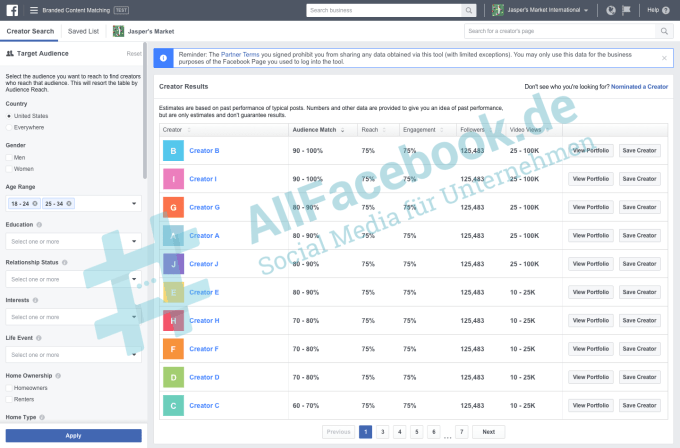
Even though Facebook will not actually broker or initially take a cut of the deals, the tool could equip brands with much more compelling and original marketing content. That could in turn encourage them to spend more on Facebook ads to spread that content, while also making more entertaining and tolerable the ads users see so they spend longer on the social network. By getting creators paid, even if not directly by Facebook, they’ll invest more in the quality of their content and size of their following on the app instead of with competitors.
How Facebook’s influencer marketing search engine works
A Facebook spokesperson explained the motive behind the tool like this. Facebook wants to help businesses find creators who can reach their target audience in an authentic way, while allowing creators a path to monetizing their Facebook content and fan base. Creators opt in to participating in the test and set up a portfolio showcasing their audience size and metrics plus their best branded content. Facebook is starting the program primarily with a set of lifestyle brands and creators.
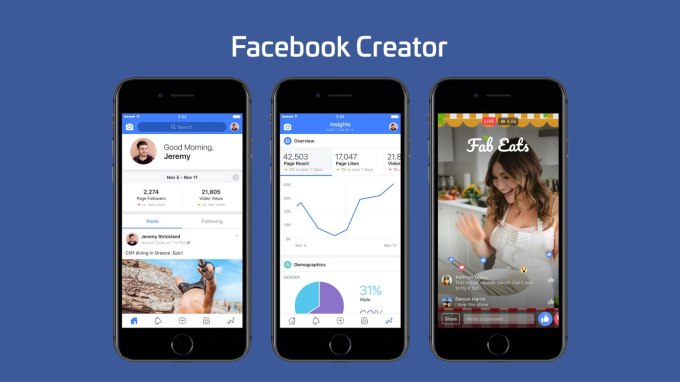
Advertisers in the test can search for creators with specific audience demographics using a wide range of targeting options. Those include both general and industry-specific parameters, like:
Top countries where they’re popular
Interests
Gender
Education history
Relationship status
Life events
Home ownership status
Home type
The search engine’s results page shows a list of creators with each’s audience match percentage to the search terms, percentage of their followers they reach, engagement rate, follower count and video views. Advertisers can save their best matches to private lists, and reach out to contact the creators, though Facebook is still figuring out if it’s best to connect them through their Facebook Page or traditional contact info. One question is how Facebook will ensure it’s only connecting businesses to brand-safe creators who won’t get them in trouble by posting racist, sexist or objectionable content the way star YouTuber PewDiePie did.
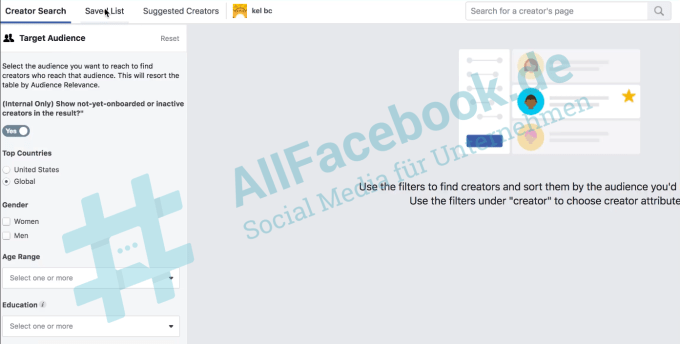
The deals for product placement or sponsored content creation and sharing are then worked out between the brand and creator without Facebook’s involvement. The platform is not taking any revenue cut during the testing phase, but longer-term will evaluate whether it should. The only thing Facebook doesn’t allow is pure re-sharing deals where influencers are paid to just post the brand’s pre-made content they didn’t help create.
The crowdsourced future of advertising
Foreshadowed in the launch of its dedicated Facebook Creator app in November, this is the company’s first serious foray into influencer marketing. This emerging industry holds the potential to overhaul the way advertising content is produced. In days of old, brands couldn’t target very narrow segments of their customers because they were using broadcast mediums like TV commercials, magazine ads and billboards, or endorsements from mainstream celebrities like movie actors. They might only make a few separate styles of marketing campaigns that would appeal to wide swaths of their target audience.
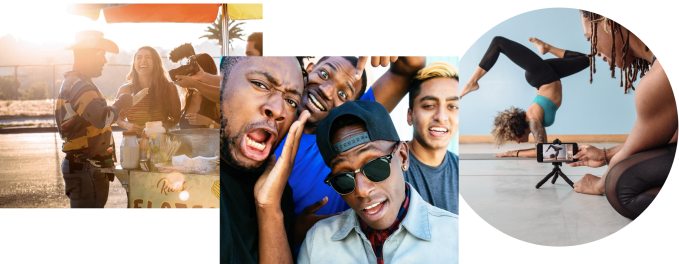
With the internet and targeting data-rich social networks like Facebook, they can reach extremely specific subsets of their customers with marketing messages tuned to their identity. But reaching these niche audiences with corporate content that feels authentic rather than fake and smarmy is difficult. That’s where social media creators come in. Not only do they have a pre-existing and intimate relationship with their fans who’ll take their endorsements to heart, they’ve also already spent years figuring out exactly what type of content appeals to these specific people. When they team up with brands, the businesses get their products recontextualized and interpreted for that audience with content they could never come up with themselves.
Twitter realized this early, which is why it acquired creator-brand deal broker Nichefor a reported $50 million back in 2015. [Disclosure: I got fascinated with this industry because my cousin Darren Lachtman is one of the co-founders of Niche.] But now as Facebook seeks to attract influencers and their audiences to its social network, it’s trying to find ways to get them paid. Otherwise, they’re likely to stray to YouTube’s ad revenue shares and Patreon’s subscription payments. So far Facebook has tested tipping and subscriptions from fans, as well as letting creators host ad breaks — essentially commercials — during their videos. But brands want the creators’ help designing the content, not just distributing it.
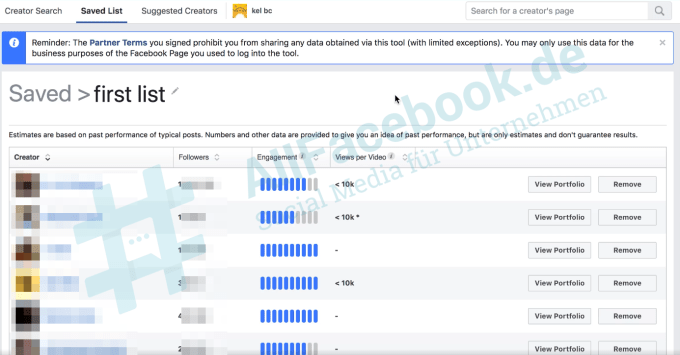
But what about Instagram and YouTube influencers?
The Branded Content Matching search engine will help brands find those creators… but only on Facebook for now. The tool doesn’t pull in their audience sizes and metrics from other important platforms like Instagram, YouTube, Twitter, Snapchat or Twitch. Brands don’t get a holistic view of the value and reach of a creator, who might be way more popular on another platform than Facebook.
And really, Instagram is where all these influencers spend their time and share their content. Though Facebook owns it, it says it’s not showing Instagram influencers in the tool at the moment. Adding them in, the same way advertisers can push ads to Facebook and Instagram from one interface, would make the search engine much more powerful.
There’s already a whole industry of independent creator search engines and databases for marketers like Hypr, Whalar, Fohr Card, Tap Influence and Creator IQ. If Facebook built one with first-party data from across its properties, or even pulled stats from competing platforms, it might squash these startups. Alternatively, it might buy one to ramp up its efforts here like how Twitter bought Niche.
Facebook is running out of ad inventory in the News Feed. It needs to make each ad better and more watchable so it can grow revenue by charging more per ads rather than selling more ads. Meanwhile, yesterday it started testing ads in Facebook Stories, where brands will need help navigating the more personal, vertical video format. Awesome content made by creators could be the answer. And Facebook could finally start helping more of these artists, comedians and storytellers turn their passion into a profession.
Right Now

16 Jul, 2025 / 09:31 AM
Google inks $3 billion US hydropower deal in largest clean energy agreement of its kind
Top Stories









